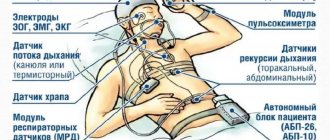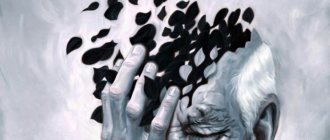Diogenes syndrome (senile squalor) is a variant of age-related social degradation of personality, a mental disorder accompanied by neglect of one’s own appearance, lack of shame, isolation with apathy. A patient with this disorder collects a lot of unnecessary and old things, which he most often picks up on the street, landfills, and garbage bins. A person with this problem needs help from loved ones, and sometimes specialized help. If your relatives have signs of this type of dementia, get treatment for Diogenes syndrome at a medical clinic. Some psychiatrists point out the discrepancy between the name of the disease and the name of Diogenes, since he did not have this disorder. The philosopher did not collect and did not retire. On the contrary, he sought to communicate with people. But the similarity of the patients with the personality of Plyushkin from Gogol’s “Dead Souls” is quite pronounced.
Reasons for the formation of the disease
To determine the correct treatment tactics for Diogenes syndrome, it is necessary to understand the causes leading to mental disorders. Patients are diagnosed with increased activity in certain areas of the cerebral cortex. They are responsible for the decision-making function, analysis of cleanliness criteria, and sensation of unpleasant odors. Failure to process information leads to indifference. Unrestricted zones of need force the sick person to collect rubbish and take it to his home. Cortical structures do not allow one to correctly perceive the need and usefulness of things.
Damage to areas of the cortex is caused mainly by organic diseases of the brain, complemented by the characteristics and social status of the patient.
Predisposition to the development of senile squalor is:
Head injuries with damage to brain structures, including surgical operations. We are talking about the formation of a delayed painful response of the central nervous system to a traumatic factor.- Toxic encephalopathies are diseases that develop during acute or chronic poisoning of the body, as a result of which neurons suffer the most. Often the cause of these pathologies is alcoholism.
- Infectious diseases leading to the development of encephalitis.
- Degenerative processes in the central nervous system. Most often we are talking about a hereditary pathology - Pick's disease (a variant of senile dementia).
- Age-related accentuations of existing inclinations to collect at a younger age.
- Stress.
All these factors require monitoring of sick people and timely consultation with specialists. In our clinic you can undergo diagnostics for the purpose of early detection of the disease.
Expert opinion
A psychiatrist, psychotherapist, narcologist, full member of the European Association of Transactional Analysis, Sergei Andreevich Novikov, answered this question to an InHa.ru correspondent:
Quite often on the streets of our cities we see unkempt elderly people collecting and carrying into their homes a huge amount of various kinds of rubbish and garbage. The media often publishes materials devoted to this problem. Such programs and reports are initiated mainly by tired neighbors and relatives of these individuals; they do not know how to get along with a person who carries all kinds of garbage into the house and does not accept any criticism addressed to him.
Let's figure out from which side we can approach such “Plyushkins” or, perhaps, it’s not worth trying to do this, but is it better to immediately call an ambulance?
Plyushkin syndrome (better known among psychiatrists as Diogenes syndrome or syllogomania ) was first described in 1966. This disorder most often occurs in older people, but sometimes it also occurs in young people (“prolonged collecting”). People suffering from this disease are most often very untidy and practically do not take care of themselves; they are absolutely indifferent to the sewage that accumulates in their home. They bring various types of garbage into the house, telling themselves and others: “It will come in handy someday,” but this moment still does not come, and the amount of trash increases every day (by the way, quite often these people are not beggars, but have very good savings) .
Read more: Children's fears. Causes, types and fight against phobias
The garbage begins to emit a very unpleasant smell, which attracts cockroaches and rodents and begins to attack the apartments in the neighborhood. This is where the neighbors can't stand it! First, they offer help, and when they receive a rude response and complete rejection of help (which is also a manifestation of this disorder), they begin to contact housing and communal services, the police, the media, etc.
This phenomenon can occur in people suffering from alcohol addiction, dysfunction of the frontal lobe of the cerebral cortex, as well as in various mental disorders of old age.
Daria:
“All our attempts to explain to our father that he will never need so many things only lead to scandals. He becomes very aggressive, defending his “treasures”. It seems to him that we are encroaching on his “good”, we want to appropriate it for ourselves... And after we, taking advantage of the fact that he went to the trash heap for another “booty”, took those ill-fated glasses away from the house, he screamed and was indignant the whole week. And then he stopped talking to us altogether. We don't communicate anymore..."
Complaints and symptomatic picture of Diogenes syndrome
The initial signs of a developing disorder are subtle. The patient gradually begins to buy excessive quantities of food, things, and medicines. Then he begins to neglect hygiene rules. Over time, the symptoms begin to expand and intensify.
The patient is diagnosed with:
Pathological passion for hoarding, stinginess. Housing is filled with old and unnecessary things that accumulate as trash in all corners. Soon the entire living space is filled with garbage. The surrounding area is unsanitary and parasites breed. Relatives can't do anything. Attempts to clear an apartment or house of clutter cause pronounced resistance in the patient, even to the point of screaming and assault.- Aggressive behavior, irritability, short temper and conflict, accompanied by rudeness and curses directed at all people.
- Sloppiness in clothing, indiscriminate eating. The patient stops taking care of himself, cutting hair and nails, washing, and brushing his teeth.
- Partial and complete loss of modesty. A sick person can walk without clothes in front of strangers and defecate anywhere.
- The desire for complete isolation, suspicion, distrust.
- Avoiding any communication with people, even loved ones.
- Refusal to help.
Timely treatment of Diogenes syndrome in a hospital setting will not only stop the development of the disorder, but also prevent possible complications.
The examination often reveals:
- Chronic respiratory diseases.
- Pathology of the gastrointestinal tract.
- Coronary heart disease, angina pectoris, hypertension, arrhythmias.
- Complications from the musculoskeletal system.
- Neurological symptoms.
- Diabetes.
- Psoriasis.
- Helminthic infestations.
How to recognize
Most often, pronounced manifestations of this mental disorder occur in people over 55 years of age, but changes in behavior begin much earlier, although they remain invisible to the person and his relatives. The main symptom of this disease is the desire to accumulate things.
It all starts with the fact that a person does not want to throw away unnecessary items, believing that they may be useful to him in the future, but later he begins to experience pleasure from receiving things. Even at an early stage of the disease, if one of the relatives indicates the need to get rid of certain objects, a person suffering from Diogenes syndrome experiences strong negative feelings.
If relatives insist on the need to rid the living space of unnecessary things, the patient begins to be offended and even starts a scandal, because... he is not ready to part with his “treasures”. This will take him out of his comfort zone and will be regarded as a great loss.
- People suffering from Diogenes syndrome often face condemnation from loved ones and neighbors, so they gradually try to protect themselves from communication with others. The patient becomes apathetic and stops taking care of personal hygiene and the cleanliness of clothes and living quarters. Shyness gradually disappears.
- However, the degradation does not stop. The patient begins to collect even broken and expired items. Items that end up in the “collection” become increasingly trashy.
- At the same time, attempts to forcibly free the premises from accumulated things can provoke an attack of aggression in the patient.
Some people with this syndrome have a habit of keeping dozens of pets in their homes, despite finding it difficult to care for them, let alone take care of their own health.
Clinical psychologist Veronika Stepanova in the video identifies the main reasons for this behavior. Women are more prone to hoarding after a divorce, as they fear for the future; holding things in their hands gives pleasure.
Read more: Stages of family development
“Things love to be used. But Plyushkin does not use them, but only collects them; he is driven by the idea of collecting, accumulating and holding on to an unknown future.”
Diagnostics
At the Leto clinic, patients are examined by a psychiatrist. The diagnostic stage includes identifying the characteristic symptoms of Diogenes syndrome.
In this case, the doctor carries out:
Conversation with the patient in the presence of close people. During the interview, the doctor identifies specific signs of the disease.- Dynamic control over the patient. Observation allows us to identify accompanying disorders characteristic of the disease.
- Additional studies if necessary (CT and MRI of the brain).
Cost of services
| CONSULTATIONS OF SPECIALISTS | |
| Initial consultation with a psychiatrist (60 min.) | 6,000 rub. |
| Repeated consultation | 5,000 rub. |
| Consultation with a psychiatrist-narcologist (60 min.) | 5,000 rub. |
| Consultation with a psychologist | 3,500 rub. |
| Consultation with Gromova E.V. (50 minutes) | 12,000 rub. |
| PSYCHOTHERAPY | |
| Psychotherapy (session) | 7,000 rub. |
| Psychotherapy (5 sessions) | 30,000 rub. |
| Psychotherapy (10 sessions) | 60,000 rub. |
| Group psychotherapy (3-7 people) | 3,500 rub. |
| Psychotherapy session with E.V. Gromova (50 minutes) | 12,000 rub. |
| TREATMENT IN A HOSPITAL | |
| Ward for 4 persons | 10,000 rub./day |
| Ward for 3 persons | 13,000 rub./day |
| Ward 1 bed VIP | 23,000 rub./day |
| Individual post | 5,000 rub. |
| PETE | 15,000 rub./day |
This list does not contain all prices for services provided by our clinic. The full price list can be found on the “Prices” , or by calling: 8(969)060-93-93. Initial consultation is FREE!
Prevention
To reduce the risk of developing hoarding disorder, people over 45 years of age are advised to lead as active and healthy a lifestyle as possible. You need to eat right, go to the pool and gym. You should give up bad habits. In addition, you need to avoid stress and sleep at least 8 hours a day. It is advisable to find new hobbies and regularly perform exercises to develop memory.
Read more: Thanatophobia - fear of death
In the video, psychotherapist Tatyana Skiba talks about the prevention of pathological hoarding syndrome:
How to treat Diogenes syndrome
Drawing up a therapeutic plan requires taking into account the pathology that caused this variant of senile dementia. If the initial stage of disorders is detected, an outpatient treatment cycle can be prescribed. In the future, against the background of a progressive clinical picture of the deviation, mandatory hospitalization will be required.
Our mental health center has created all the treatment and rehabilitation conditions for the treatment of patients of this profile. They are monitored around the clock and provided with care and feeding appropriate to their condition.
The treatment plan for Diogenes syndrome includes:
- Drug therapy. Patients are selected with the necessary etiotropic (causal) and symptomatic-pathogenetic (alleviating painful manifestations) drugs. Doctors use vascular agents with a mild effect and minimal side effects. Cognitive impairment can be controlled with nootropics. To suppress aggression, sedatives are prescribed. In case of obvious psychotic reactions, antipsychotics are selected. Relief from depression is achieved with the help of antidepressants. Psychotropic groups regulate sleep and behavior disorders.
Psychotherapeutic consultation. This type of assistance is required by relatives. The psychologist reveals to loved ones the nuances of the course and treatment of Diogenes syndrome and explains the essence of the therapy. A specialist helps to properly adapt to a sick person and minimize the negative consequences of communicating with him. Convinces that it is possible to live with the patient under the same roof, provided that the basic rules of maintaining cleanliness are followed.- Rehabilitation. Of course, it is impossible for a person suffering from “senile squalor” to recover, but medicine and relatives can make his life better. Therefore, the main task of the specialists of the Leto clinic is to provide increased attention to their clients, communicate with them, and use a complex of aesthetic therapy methods. Walking in the fresh air, listening to music, poetry, drawing and creative finger work inhibit the development of the disease, improving the condition of patients.
After discharge, relatives should surround their loved one with care and warmth, communicate with them as often as possible and not respond to possible attacks of aggressive behavior. Any questions? Call our center and you will be provided with all the necessary advice on caring for the sick.
Munchausen syndrome
Munchausen syndrome is a chronic disorder in which the patient deliberately feigns symptoms of illness and injures himself in order to undergo medical treatment and all kinds of examinations. The syndrome was named after Carl Friedrich Hieronymus, Baron von Munchausen, who was famous for telling stories of his fictitious exploits.
Patients with Munchausen syndrome constantly require attention to themselves and their symptoms and may behave aggressively if they do not receive the support they need. Such a patient may cause harm or pain to himself in order to make his suffering look as believable as possible. People susceptible to this disease are even able to falsify their tests in order to get the attention of doctors or hospitalization. Simulating an illness allows a person with Munchausen syndrome to surround himself with care that he does not receive in ordinary life.
The causes of the syndrome are not fully understood. There are many assumptions, and they are all based solely on psychological reasons. One of them is that this disease develops due to lack of attention from adults in childhood. Munchausen syndrome often manifests itself against the background of mental trauma, for example, due to physical or sexual abuse.











